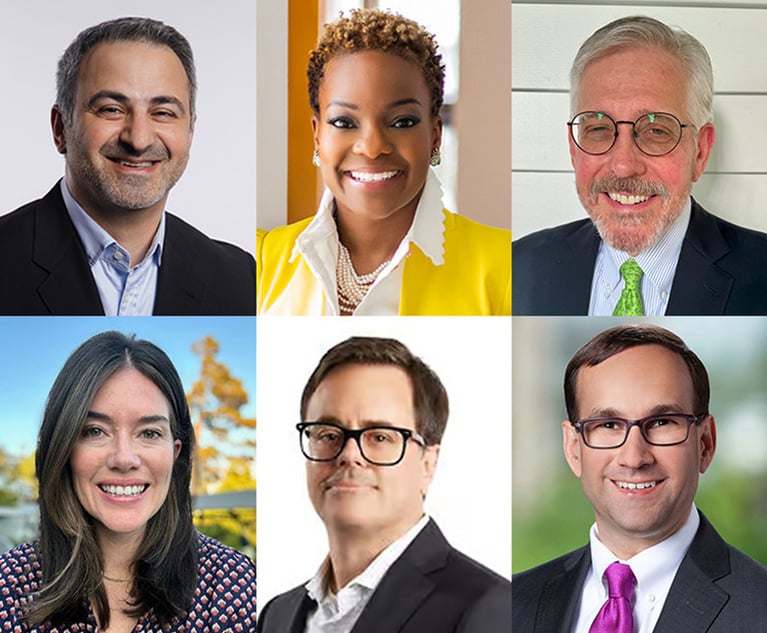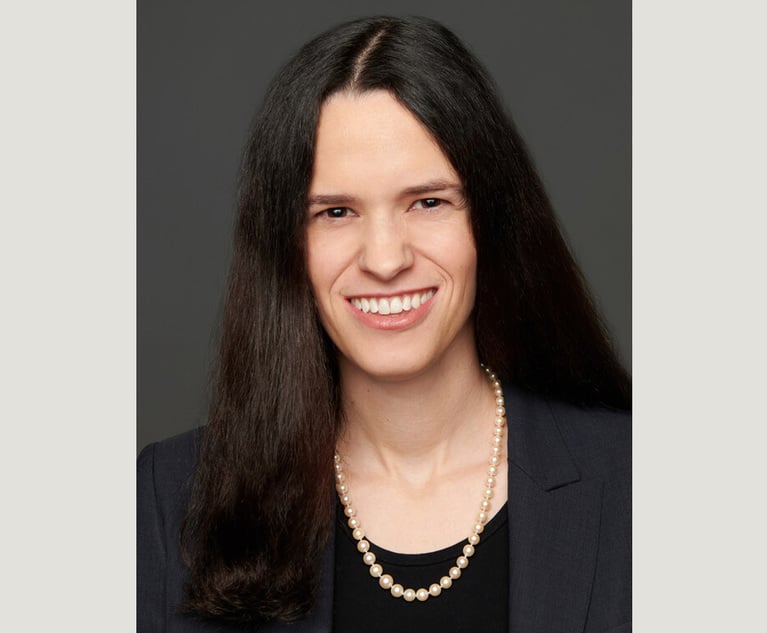San Francisco Sues Uber Over Access to Driver Information
The San Francisco city attorney on Thursday sued Uber Technologies Inc. over access to records about the ride-hailing company's drivers, escalating a conflict that the company said raises privacy issues.
May 11, 2017 at 05:39 PM
8 minute read
The San Francisco city attorney on Thursday sued Uber Technologies Inc. over access to records about the ride-hailing company's drivers, escalating a conflict that the company said raises privacy issues.
The city Treasurer and Tax Collector's Office said it had periodically requested, since 2014, information from Uber about its drivers to investigate compliance with business and tax regulations. San Francisco's lawyers said Uber in December stopped providing the city with that information. Uber this month filed court papers to quash a subpoena from the city tax collector, arguing the demand for information was overbroad and that it violated drivers' privacy rights.
San Francisco's lawyers on Thursday called Uber's privacy argument a “complete red herring.” Uber's drivers—the company classifies them as independent contractors—should be required to comply with the same license requirements that broadly apply to other businesses, the city said.
“San Franciscans have a right to know who is behind the wheel when they're being driven somewhere,” Dennis Herrera, the San Francisco city attorney, said in a statement. “Not surprisingly, Uber is thumbing its nose at the law. It's time for that to stop.”
San Francisco's petition asks a judge to force Uber to disclose the names and addresses of its drivers in San Francisco. Independent contractors, the city said, are required to get a business certificate if they operate more than seven days a year.
Wayne Ting, Uber's general manager in San Francisco, said in an email that the company doesn't dispute that its drivers, as independent contractors, must obtain business licenses.
“But the Tax Collector's office is asking us to give them personal information of drivers—including their home address—without their consent and will put that information on a public website,” Ting said.
The city has denied Uber's request to get drivers' consent first and to allow them to remove their public information from the website, Ting said.
Davis Wright Tremaine partner Allison Davis and counsel Sanjay Nangia represent Uber in the dispute in San Francisco Superior Court.
San Francisco's suit adds to litigation and public-relations headaches at Uber. The company is reportedly grappling with state and federal investigations over its use of technology called “Greyball” to evade regulators in cities where the ride-sharing service hadn't yet been approved. Uber's also fighting trade-secret theft claims—lodged by Waymo, Google's driverless car unit—that could upend the company's investment in autonomous vehicles.
Uber has long clashed with state and local regulators. The San Francisco-based company agreed in April 2016 to pay up to $25 million to settle allegations by district attorneys in San Francisco and Los Angeles that it overstated its safety measures. The California Public Utilities Commission last year fined Uber $7.6 million for failing to turn over driver and ride data to the agency.
Uber and Lyft Inc. are backing legislation—Senate Bill 182—that would block the public disclosure of any driver's local business license data. The bill also would allow an Uber or Lyft driver to obtain just one permit in the city where he or she lives, regardless of how many cities in which the driver operates.
The city and county of San Francisco oppose the bill, arguing that ride-hailing drivers should not be exempt from the same rules and public disclosures applied to other businesses.
“We are in this situation because Uber insists that its drivers are not its employees. Forcing drivers to become independent contractors means each is their own business,” Herrera said. “That's a consequence of Uber's drive to fatten its bottom line at the expense of the people doing the work.”
Related Articles:
|- Google Has No 'Smoking Gun' In Waymo-Uber Trade Secrets Case, Judge Says
- Who's Suing Uber Now?: Lyft Drivers
- The Consequences of Failing to Respond to Harassment Allegations
- Uber's 'Greyball' Program Puts New Focus on Legal Dept.
The San Francisco city attorney on Thursday sued Uber Technologies Inc. over access to records about the ride-hailing company's drivers, escalating a conflict that the company said raises privacy issues.
The city Treasurer and Tax Collector's Office said it had periodically requested, since 2014, information from Uber about its drivers to investigate compliance with business and tax regulations. San Francisco's lawyers said Uber in December stopped providing the city with that information. Uber this month filed court papers to quash a subpoena from the city tax collector, arguing the demand for information was overbroad and that it violated drivers' privacy rights.
San Francisco's lawyers on Thursday called Uber's privacy argument a “complete red herring.” Uber's drivers—the company classifies them as independent contractors—should be required to comply with the same license requirements that broadly apply to other businesses, the city said.
“San Franciscans have a right to know who is behind the wheel when they're being driven somewhere,” Dennis Herrera, the San Francisco city attorney, said in a statement. “Not surprisingly, Uber is thumbing its nose at the law. It's time for that to stop.”
San Francisco's petition asks a judge to force Uber to disclose the names and addresses of its drivers in San Francisco. Independent contractors, the city said, are required to get a business certificate if they operate more than seven days a year.
Wayne Ting, Uber's general manager in San Francisco, said in an email that the company doesn't dispute that its drivers, as independent contractors, must obtain business licenses.
“But the Tax Collector's office is asking us to give them personal information of drivers—including their home address—without their consent and will put that information on a public website,” Ting said.
The city has denied Uber's request to get drivers' consent first and to allow them to remove their public information from the website, Ting said.
San Francisco's suit adds to litigation and public-relations headaches at Uber. The company is reportedly grappling with state and federal investigations over its use of technology called “Greyball” to evade regulators in cities where the ride-sharing service hadn't yet been approved. Uber's also fighting trade-secret theft claims—lodged by Waymo,
Uber has long clashed with state and local regulators. The San Francisco-based company agreed in April 2016 to pay up to $25 million to settle allegations by district attorneys in San Francisco and Los Angeles that it overstated its safety measures. The California Public Utilities Commission last year fined Uber $7.6 million for failing to turn over driver and ride data to the agency.
Uber and Lyft Inc. are backing legislation—Senate Bill 182—that would block the public disclosure of any driver's local business license data. The bill also would allow an Uber or Lyft driver to obtain just one permit in the city where he or she lives, regardless of how many cities in which the driver operates.
The city and county of San Francisco oppose the bill, arguing that ride-hailing drivers should not be exempt from the same rules and public disclosures applied to other businesses.
“We are in this situation because Uber insists that its drivers are not its employees. Forcing drivers to become independent contractors means each is their own business,” Herrera said. “That's a consequence of Uber's drive to fatten its bottom line at the expense of the people doing the work.”
This content has been archived. It is available through our partners, LexisNexis® and Bloomberg Law.
To view this content, please continue to their sites.
Not a Lexis Subscriber?
Subscribe Now
Not a Bloomberg Law Subscriber?
Subscribe Now
NOT FOR REPRINT
© 2025 ALM Global, LLC, All Rights Reserved. Request academic re-use from www.copyright.com. All other uses, submit a request to [email protected]. For more information visit Asset & Logo Licensing.
You Might Like
View All
'Be Comfortable Being Uncomfortable': Pearls of Wisdom From 2024 GC Q&As

In-House Moves of the Month: Boeing Loses Another Lawyer, HubSpot Legal Chief Out After 2 Years
5 minute read

‘Badge of Honor’: SEC Targets CyberKongz in Token Registration Dispute
3 minute readTrending Stories
- 1Tensions Run High at Final Hearing Before Manhattan Congestion Pricing Takes Effect
- 2Improper Removal to Fed. Court Leads to $100K Bill for Blue Cross Blue Shield
- 3Michael Halpern, Beloved Key West Attorney, Dies at 72
- 4Burr & Forman, Smith Gambrell & Russell Promote More to Partner This Year
- 5Sanctions Order Over Toyota's Failure to Provide English Translations of Documents Vacated by Appeals Court
Who Got The Work
Michael G. Bongiorno, Andrew Scott Dulberg and Elizabeth E. Driscoll from Wilmer Cutler Pickering Hale and Dorr have stepped in to represent Symbotic Inc., an A.I.-enabled technology platform that focuses on increasing supply chain efficiency, and other defendants in a pending shareholder derivative lawsuit. The case, filed Oct. 2 in Massachusetts District Court by the Brown Law Firm on behalf of Stephen Austen, accuses certain officers and directors of misleading investors in regard to Symbotic's potential for margin growth by failing to disclose that the company was not equipped to timely deploy its systems or manage expenses through project delays. The case, assigned to U.S. District Judge Nathaniel M. Gorton, is 1:24-cv-12522, Austen v. Cohen et al.
Who Got The Work
Edmund Polubinski and Marie Killmond of Davis Polk & Wardwell have entered appearances for data platform software development company MongoDB and other defendants in a pending shareholder derivative lawsuit. The action, filed Oct. 7 in New York Southern District Court by the Brown Law Firm, accuses the company's directors and/or officers of falsely expressing confidence in the company’s restructuring of its sales incentive plan and downplaying the severity of decreases in its upfront commitments. The case is 1:24-cv-07594, Roy v. Ittycheria et al.
Who Got The Work
Amy O. Bruchs and Kurt F. Ellison of Michael Best & Friedrich have entered appearances for Epic Systems Corp. in a pending employment discrimination lawsuit. The suit was filed Sept. 7 in Wisconsin Western District Court by Levine Eisberner LLC and Siri & Glimstad on behalf of a project manager who claims that he was wrongfully terminated after applying for a religious exemption to the defendant's COVID-19 vaccine mandate. The case, assigned to U.S. Magistrate Judge Anita Marie Boor, is 3:24-cv-00630, Secker, Nathan v. Epic Systems Corporation.
Who Got The Work
David X. Sullivan, Thomas J. Finn and Gregory A. Hall from McCarter & English have entered appearances for Sunrun Installation Services in a pending civil rights lawsuit. The complaint was filed Sept. 4 in Connecticut District Court by attorney Robert M. Berke on behalf of former employee George Edward Steins, who was arrested and charged with employing an unregistered home improvement salesperson. The complaint alleges that had Sunrun informed the Connecticut Department of Consumer Protection that the plaintiff's employment had ended in 2017 and that he no longer held Sunrun's home improvement contractor license, he would not have been hit with charges, which were dismissed in May 2024. The case, assigned to U.S. District Judge Jeffrey A. Meyer, is 3:24-cv-01423, Steins v. Sunrun, Inc. et al.
Who Got The Work
Greenberg Traurig shareholder Joshua L. Raskin has entered an appearance for boohoo.com UK Ltd. in a pending patent infringement lawsuit. The suit, filed Sept. 3 in Texas Eastern District Court by Rozier Hardt McDonough on behalf of Alto Dynamics, asserts five patents related to an online shopping platform. The case, assigned to U.S. District Judge Rodney Gilstrap, is 2:24-cv-00719, Alto Dynamics, LLC v. boohoo.com UK Limited.
Featured Firms
Law Offices of Gary Martin Hays & Associates, P.C.
(470) 294-1674
Law Offices of Mark E. Salomone
(857) 444-6468
Smith & Hassler
(713) 739-1250






